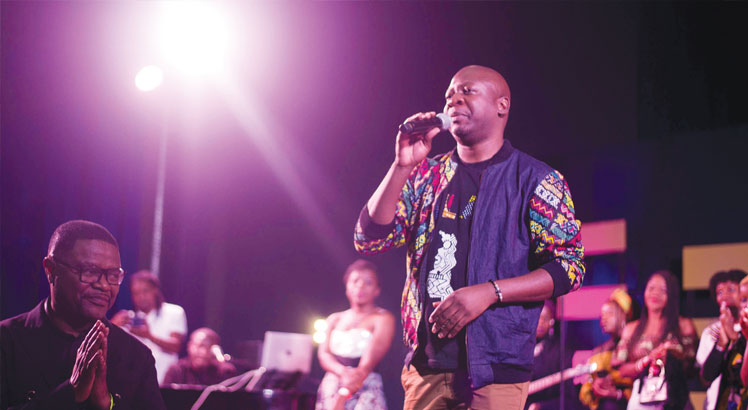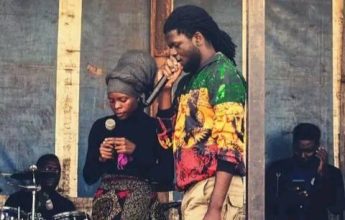Music is my vehicle: Masauko Chipembere
Known as one part of South Africa-based award-winning soul group Blk Sonshine, US-born Malawian musician Masauko Chipembere is in the country to work on his first solo album Highway with a group of young musicians from Lilongwe. He talks to Jack McBrams about the trip, his project and much more.

Q: Right now, you are on a voyage of discovery in Malawi. What is this all about?
A: Right now, the issue has been the question of what is my place within this whole Chipembere struggle for the liberation of Malawi.
And as it stands, with my mother getting older; she has been doing work in Mangochi; setting up schools and working with women and children, it is time now for me to figure out a way to take what I do, which is music, and merge it with what she is doing, which is activism, because I don’t really how to do anything unless there is
music. That is my vehicle; that is how I express my whole existence. I am trying to find a way to merge my music with her activism to push forward my father’s agenda, which was the liberation of the people of Malawi.
Q: Why is music such an important tool for you?
A: For me, music is at the centre of Malawian culture, it is part of every single thing that we do, but because of the way we have been trained, it often gets sidelined. But when I went into the villages of Mangochi, the first thing that happened is the kids were singing. And when they went into the classroom, they were learning mathematics through song. And it actually occurred to me that music is the thing that unifies us and actually makes us one people as Malawians. To consciously use it as part of how to raise our way of thinking about
ourselves and educating ourselves, that is what I am hoping for.
Q: In what contest are you merging the music into this activism?
A: First and foremost, it starts with empowering local musicians. I wanted to have a chance to record with local musicians and pay them a nice wage and begin a relationship; documenting it so that I can begin to try and get these guys out of Malawi into cultural festivals around the world and just show people Malawian culture. Because also for me, I am studying Malawian music and getting closer to the music through them.
Q: Which musicians have are you working with on this particular project?
A: The primary musician involved in Ernest Ikwanga who is an amazing guitarist and was a perfect fit. Ernest has a broad mind for music and we continue to share ideas. And then there is Sam Mkandawire, who
everybody knows won the Airtel Trace Music Star Music contest. He is a great keyboardist and a great vocalist and a great music mind in so many ways. Chambota Chirwa and played the bass. And Luciano, who is 22
years old, played the drums and he is incredible and played with so much energy and gives me a lot of hope for the future. So, it’s basically me and the guys from the Mafilika circle. All of these guys are part of their circle and they are young musicians trying to pushing the boundaries on what Malawi music can be while keeping the
tradition going. So they are perfect, they are wide-open in their thinking and ready to explore. Just that exploration alone adds something to the culture of how we see ourselves.
Q: You have toured the world as part of Blk Sonshine and even performed for Nelson Mandela. What does coming back to record in Malawi mean for you?
A: Well, I take it back to the road named after my father, the Masauko Chipembere Highway. And as a poet, when I see highway, I see of taking the higher route of higher consciousness. So, this is about me beginning to understanding that music and activism together are the higher route that I can move the Chipembere agenda forward. For me, it’s time for me to take the highway, it’s time for me to take the music to another level. And that means it has to be part of the search of my identity in Malawi. But this has to come in line with the larger
mission of the Chipembere family which is to attempt to move Malawi forward.
Q: What kind of music are you playing with this group?
A: There is what you might call Malawian rhythms. There are elements of vimbuza and ngoma, but at the same time you might hear funk, jazz and lots of reggae.
Q: What are the challenges facing the Malawian musician?
A: The basic respect for musicians in society is not where it ought to be in the sense that whenever there are political issues or things in the community where there is strife, it is the musician who is most likely to represent the community’s voice more than the politician or anyone else. We fail to recognise the importance of the musician in our whole culture. So, I am hoping that by raising the profile of the musicians by taking this group of young musicians out of the country, we are going to begin to get more respect for the musician in the
country.
Q: This is your first solo project outside Blk Sonshine. Why now?
A: Well, first and foremost, I feel like I have finally arrived as a musician in Malawi, I have found my circle of musicians. I feel like a natural group has surrounded me. It’s also that my mother is getting older and the work she is doing in Mangochi is important to me so, it feels like it is time that the process is passed down and I begin to be more involved in the whole Chipembere project. The thing is that to do that, to be able to do that, I have to do it through music because music is my vehicle.





